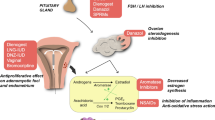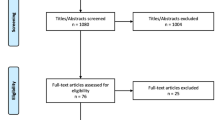While there are a number of benefits to the health of postmenopausal women from use of unopposed estrogens, the increased risk of endometrial cancer related to these hormones has led many women to use combined estrogen-progestogen therapy instead, or not to use hormones at all. Most women who take hormones do so only in the early portion of their postmenopausal years, so the risk of endometrial cancer following cessation of use might bear heavily on the overal risk/benefit evaluation. We analyzed data from a case-control study of women in western Washington (United States) to assess the magnitude of excess risk of endometrial cancer following discontinuation of estrogen use. Cases (n=661) consisted of women aged 45 to 74 diagnosed between 1985 and 1991 who resided in one of three counties in Washington State. Controls (n=865) were identified by random-digit dialing. Subjects were interviewed in-person to ascertain current and prior hormone use. The analysis was restricted to women who had not received combined estrogen-progestin therapy. Among women who had used unopposed estrogens at some time, risk of endometrial cancer declined as time since last use increased. Nonetheless, even among women who used these hormones for just a few years, the risk remained elevated by 30 to 70 percent almost a decade after cessation. These results, combined with those of most (but not all) other studies of this issue, suggest that a woman who has discontinued unopposed estrogen therapy may retain a small increased risk of endometrial cancer for a long period of time.
Similar content being viewed by others
References
Mishell, DR. Estrogen replacement therapy: an overview. Am J Obstet Gynecol 1989; 161: 1825–7.
Smith, DC, Prentice, R, Thompson, DJ, et al. Association of exogenous estrogen and endometrial carcinoma, New Engl J Med 1975; 293: 1164–7.
Ziel, HK, Finkle, WD. Increased risk of endometrial carcinoma among users of conjugated estrogens. New Engl J Med 1975; 293: 1167–70.
Voigt, LF, Weiss, NS. Epidemiology of endometrial cancer. In: Surwit, E, Alberts, D, eds. Endometrial Cancer. Boston, MA (USA): Kluwer Academic, 1989: 1–21.
Voigt, LF, Weiss, NS, Chu, J, Daling, JR, McKnight, B, van Belle, G. Progestagen supplementation of exogenous oestrogens and risk of endometrial cancer. Lancet 1991; 338: 274–7.
Henderson, BE. The cancer question: an overview of recent epidemiologic and retrospective data. Am J Obstet Gynecol 1989; 6: 1859–64.
Herrinton, LJ, Weiss, NS. Postmenopausal unopposed estrogens: characteristics of use in relation to risk of endometrial carcinoma. Ann Epidemiol 1993; 3: 301–18.
Grady, D, Rubin, SM, Petitti, DB, et al. Hormone therapy to prevent disease and prolong life in postmenopausal women. Ann Intern Med 1992; 117: 1016–37.
Brinton, LA, Hoover, RN. Estrogen replacement therapy and endometrial cancer risk: unresolved issues. Obstet Gynecol 1993; 81: 265–71.
Waksberg, J. Sampling methods for random digit dialing. J Am Stat Assoc 1978; 73:40–6.
Harlow, SD, Linet, MS. Agreement between questionnaire data and medical records: the evidence for accuracy of recall. Am J Epidemiol 1989; 129: 233–48.
Grady, D, Gebretsadik, T, Kerlikowske, K, Ernster, V, Petitti, D. Hormone replacement therapy any endometrial cancer risk: a meta-analysis. Obstet Gynecol 1995; 85: 305–13.
Finkle, WD, Greenland, S, Miettinen, OS, Ziel, HK. Endometrial cancer risk after discontinuing use of unopposed conjugated estrogens. Cancer Causes Control 1995; 6: 99–102.
Hulka, BS, Fowler, WC, Kaufman, DG, et al. Estrogen and endometrial cancer: cases and two control groups from North Carolina. Am J Obstet Gynecol 1980; 137: 92–101.
Paganini-Hill, A, Ross, RK, Henderson, BE. Endometrial cancer and patterns of use of oestrogen replacement therapy: a cohort study. Br J Cancer 1989; 59: 445–7.
Rubin, GL, Peterson, HB, Lee, NC, Maes, EF, Wingo, PA, Becker, S. Estrogen replacement therapy and the risk of endometrial cancer: remaining controversies. Am J Obstet Gynecol 1990; 162: 148–54.
Shapiro, S, Kelly, JP, Rosenberg, L, et al. Risk of localized and widespread endometrial cancer in relation to recent and discontinued use of conjugated estrogens. N Engl J Med 1985; 313: 969–72.
Weiss, NS, Szekeley, DR, English, DR, Schweid, AI. Endometrial cancer in relation to patterns of menopausal estrogen use. JAMA 1979; 242: 261–4.
Pettersson, B, Adami, HO, Persson, I, Bergstrom, R, Lindgren, A, Johansson, EDB. Climacteric symptoms and estrogen replacement therapy in women with endometrial carcinoma. Acta Obstet Gynecol Scand 1986; 65: 81–7.
Greenland, S. Dose-response and trend analysis in epidemiology: alternatives to categorical analysis. Epidemiology 1995; 4:356–65.
Persson, I, Adami, HO, Bergstrom, R, Krusemmo, UB, Hoover, R. Survival in women receiving hormone replacement therapy: a record-linkage study of a large population-based cohort. J Clin Epidemiol 1990; 43: 677–85.
Chu, J, Schwied, A, Weiss, N. Survival among women with endometrial cancer: a comparison of estrogen users and nonusers. Am J Obstet Gynecol 1982; 143: 569.
Additional information
Division of Public Health Sciences, Fred Hutchinson Cancer Research Center, the Department of Epidemiology, University of Washington Department of Biostatistics University of Washington, Seattle, WA. Department of Epidemiology, University of Washington, Seattle, WA 98195, USA. This research was supported by US National Cancer Institute contracts R01 CA47749 and R35 CA39779.
Rights and permissions
About this article
Cite this article
Green, P.K., Weiss, N.S., McKnight, B. et al. Risk of endometrial cancer following cessation of menopausal hormone use (Washington, United States). Cancer Causes Control 7, 575–580 (1996). https://doi.org/10.1007/BF00051699
Received:
Accepted:
Issue Date:
DOI: https://doi.org/10.1007/BF00051699




